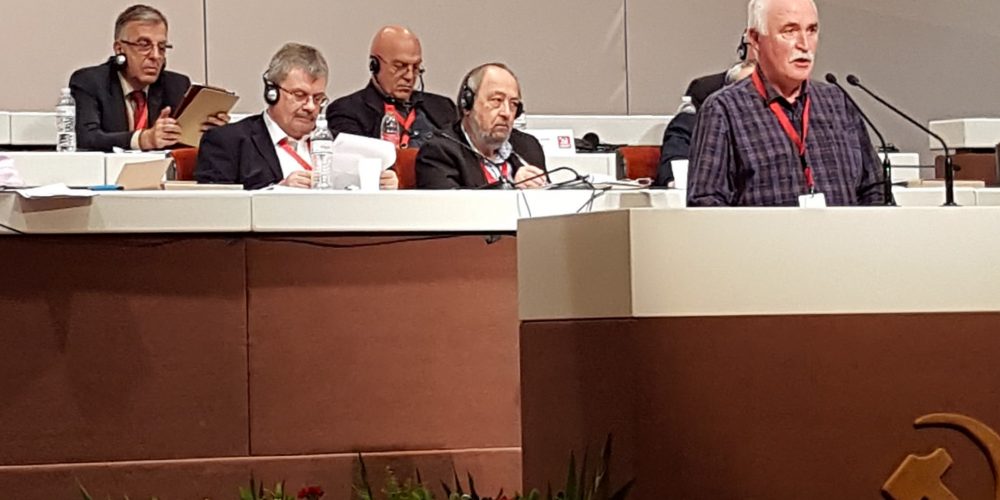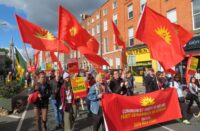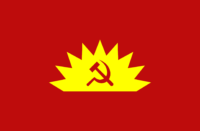Speech at the international communist meeting, Athens, by Eugene McCartan, general secretary, CPI
Comrades,
Imperialism is mired in an ever-deepening crisis. At the global, regional and national levels the system is now enmeshed, through its contradictions, in several interconnected crises—economic, political, environmental, cultural, and moral.
It is the role of communists to bring clarity and understanding to the multiple crises facing workers: mass unemployment, growing poverty, precarious employment, precarious shelter, precarious health, and precarious old age.
Communist parties are, of necessity, involved in the day-to-day immediate struggles of the working class, such as the defence of wages and conditions, and must be the most militant and determined protagonists in these struggles. We have a responsibility to base our activity in the context of our overall revolutionary strategy.
It must be admitted that our movement has not always been consistent in this regard. Historical experience shows us how easy it is to drift into the mire of reformist social-democratic thinking when concentrating on short-term objectives, like the electoral cycle, posing the question “Whom do we attempt to build alliances with and what goals do we wish to set ourselves?”
The challenges facing the workers’ movement globally are certainly shaped by the deepening crisis of the capitalist system, a system that requires constant growth in conditions of finite resources. This growing scarcity of resources is forcing it to intensify the exploitation and destruction of the natural environment, worsening global warming and affecting the lives of tens of millions of working people. It is becoming ever clearer that there is no capitalist solution to the environmental crisis.
The crisis of the system continues to throw up difficult questions and challenges, adding new urgency to the old question of “reform or revolution.” We, as communists, are not opposed to reforms but to reformism, which tends to save or even to strengthen capitalism.
Attempts to manage these crises in the interests of state-monopoly capitalism have intensified class conflict, posing four core questions for the communist and workers’ movement around the world: the nature of revolutionary transformation; the defence and deepening of democracy; the protection of a sustainable natural environment; and the promotion of world peace.
The demands posed by the Communist Party of Ireland are those that will lead to a transformation of our society and shift the balance of economic and political forces decisively in the interests of the working class, to raise class-consciousness, demands that will strategically open up and allow for the building of the necessary forces to advance to socialism.
State-monopoly capitalism has, of course, its own reforms to pose: the undermining of national democracy, national sovereignty and workers’ rights by means of the centralising of control and power in technocratic institutions, along with the removal of economic decision-making from democratically accountable institutions. These are not merely a strategy but a structural necessity for it to thrive. Keynesianism has outlived its usefulness in this regard and is now viewed as an obstacle to be removed.
The continued centralisation of power in such institutions as the European Union is also reflected in the transnational agreements TTIP and CETA. Even the limited forms of democracy experienced under capitalism have become a hindrance to the needs of state-monopoly capitalism.
These assaults on the limited democracy experienced by the people, coupled with the constant attacks on workers’ rights and living standards, are provoking growing resistance globally as working people begin to question the mantra of “There is no alternative.” National governments have increasingly become gatekeepers of the interests of global monopoly capitalism.
We can see the dual role that the EU plays in the protection of class interests at the national and the EU level. The ruling classes at the national level ceded powers to the EU (thereby appearing weak) in order to shield themselves and to damp down national class struggles.
By presenting economic and fiscal policies as a fait accompli, deriving from “our” democratically agreed EU treaty obligations, they are able to argue that economic and fiscal policies are non-political and are mere matters of technical competence—all of this to subtly reinforce the idea that there is no alternative.
This duality of the EU is expressed in:
- EU competition law preventing state aid to national industries
- the “single market,” meaning little more than the right of corporations to move capital throughout the EU internal market
- intensifying economic competition between EU member-states, creating greater momentum for liberalisation.
What capitalism needs to secure for its own survival, its own objective interests, is the central purpose of the internal market—that is, to increase downward competition within Europe, its very own race to the bottom. The so–called “freedom” of movement is the freedom for capital to exploit.
This also applies at the global level. We communists face the challenge of analysing and understanding the deep structural changes necessitated by capitalism itself. The drive for market expansion is approaching the limits of its capacity for growth. Financialisation and monopolisation have proved unable to overcome stagnation.
The constant drive to control production and markets and to exploit natural resources is already having a devastating impact on the lives of billions of people, as well as causing the destruction and elimination of thousands of species of plants and animals. Irreparable damage has already been done to the bio-diversity of our planet, ultimately threatening human existence.
Growing militarisation is yet another threat to our planet, with such schemes as the European Defence Industrial Development Programme (€500 million), Military Mobility (€6½ billion), and the European Defence Fund (€13 billion), along with Permanent Structured Cooperation (PESCO), all coming into existence in the last year alone. The Irish government under PESCO will be obliged to upgrade and develop the Irish armed forces at a cost of an additional €6 billion a year.
The EU security and defence budget is to increase 22-fold in 2021, to €28 billion. This is not including border control, with a budget of €21 billion for an army of 10,000 border guards, or the many other hidden billions that will aid in the development of the military-industrial complex in Europe.
This armaments industry was already worth more than €97 billion in 2014 and employs more than 500,000 people directly and 1.2 million indirectly. It is an untapped goldmine in the eyes of Jean-Claude Juncker, president of the EU Commission, and many other EU officials.
France and Germany have some of the biggest arms-manufacturing companies in the world. EU arms exports amount to over 27 per cent of the world’s total, second only to the United States, which exports 34 per cent.
Forces at the heart of the EU want further fiscal integration, for tighter monetary controls, and a deepening of militarisation. At the same time we are witnessing a growing alienation among workers throughout the EU, with the EU itself and the decades-long austerity programmes that it has imposed.
It is a myth to suggest, as speech after speech does, that “more Europe” will bring us closer to a “Social Europe.” Why have the social democrats and trade unions always supported closer EU integration? Because it was accompanied by a social promise, sometimes implicitly. There was a belief that economic integration would spill over into neighbouring areas of politics and ultimately bring about “Social Europe.” This has proved itself patently false.
The growing uniformity of the member-states has not prevented economic integration from becoming increasingly radical, but radical in the interests of capital; and this ultra-capitalism has permeated every conceivable area of politics. Yet some still argue that the EU is somehow salvageable. The submission to capitalism is complete, and its roots are safely entrenched.
Private providers see European competition law as a godsend. It is centred towards even further liberalisation, which is private enterprise’s ultimate goal.
We know that European economic integration serves to amplify globalisation.
And the working class know that the EU is the problem, but they are not clear why. Workers are reacting to their lived material conditions. We must understand their (mistaken) sense of powerlessness and the attacks on their living standards. We must reframe the discussion about the EU in a way that makes sense of their worsening conditions and growing precariousness in life, an analysis that does not demonise their misgivings but refocuses their anger into challenging the power and control of capital.
If we do not speak to them and provide them with this analysis, the Right will do it for us. That is where we can make a strategic intervention and present clarity where the Right can only sow confusion and division.
The current crisis triggered by the Brexit vote, and now the publication of the terms and conditions of the British state “leaving” the EU, are just another expression of the growing contradictions within capital in Britain itself, within the EU, and in the United States. Within the EU the balance of forces is shifting, and each solution presented by the EU accentuates those contradictions.
Both “remainers” within Britain and the EU and “Brexiteers” have been using Britain’s border in Ireland as a means of securing their strategic positions. The EU and the remainers within the British Conservative Party, with significant support among British Labour Party MPs, are holding on fast to the mantra of “no border in Ireland,” and using the Belfast Agreement (1998) as a stalking-horse for bringing this about, using the Irish national question as a pawn on the chess board.
Meanwhile the Brexiteers of the British establishment are using unionism to lever May’s government into taking a harder line with the EU. At the same time the Democratic Unionist Party have been attempting to use the Brexit negotiations to undermine the Belfast Agreement. Brexit has brought about a crisis in both the British union and the European Union.
The social-democratic Left as an organised force continues to decline, but that does not mean a weakening of social-democratic ideas and illusions within the working class. Reformist forces throughout the EU are offering the working class more of the same, more EU and deeper EU integration, while the class is looking for more accountable national governments and to have their vote mean something.
The Right appears to be capturing the mood of the class, capitalising on the general disillusionment with the EU, creating serious problems for our movement. While we fish in the same pool, we offer different solutions to workers; but those solutions can make sense only when they accurately describe workers’ experiences and reflect material conditions. The Right offer easy and emotional answers, steering the class away from concrete solutions that challenge the system itself.
The political demand for national democracy and sovereignty is the ground upon which we can attack both the hard-nationalist Right and the integrationist EU forces in the ruling class. We must articulate demands that give expression to the real needs of the working class and provide a revolutionary way forward.
Another area that we need to look at is the role of the euro as a mechanism for imposing fiscal controls by the central core countries on behalf of monopoly capitalism. Is this a possible structural weakness that we can attack and so weaken the superstructure of the EU?
In Ireland the ruling class maintains itself through an alliance with both the EU political establishment, providing a veneer of sophistication, and international monopoly capital, providing fake growth in GDP and some jobs in the economy. The position of our ruling class was exposed in the case of the Apple tax deal as a bankrupt state fights to give billions away and make sure that Apple, and others, can continue to use Ireland as a tax haven.
Politically, the state and ruling class have embraced liberalism as a means of providing for “democratic” debate in a space safe for monopoly capital to continue to ride roughshod over workers’ rights. Recent referendums on marriage equality and abortion, while very welcome and progressive, are afforded far more space than debates about our tax regime or the public social ownership of water.
Because there is a vacuum left by the collapse of social democracy, this does not mean that we should move into that political swamp. Rather it is a time for greater ideological clarity, greater understanding of our enemy and its growing contradictions.
At a conference like this we understand the common features of our parties and movements; no matter where we are in the world we all fight for the destruction of capitalism, the overthrow of imperialism. But it is also important that the very real material differences in conditions and the balance of forces in our countries be considered.
We need to re-establish trust and respect among ourselves. Without the unity of communist forces we could miss making a decisive contribution to the advancement of our class.
This does not mean a unity of polite silence but a unity of respectful exchange of experiences and discussion of our differences, with an understanding of them.
It is through challenging each other in debate that we can all grow and develop our ideology. This challenging does not lead to the abandonment our revolutionary ideology but to a sharpening of it, for use in class warfare, a war in which solidarity will be the key.






